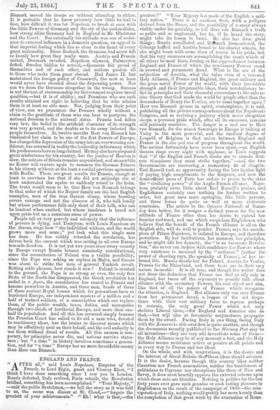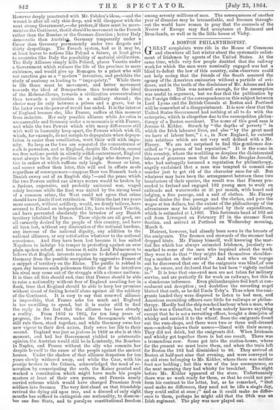ENGLAND AND FRANCE.
"AFTER FTER all," said Louis Napoleon, Emperor of the XI French, to Lord Elgin, guest and Viceroy Elect, " I think I have done something since I saw you in London. Russia defeated, Italy revived, Paris rebuilt, the Revolution bridled, something has been accomplished." "Your Majesty," —said the polite Scotchman,—we tell the story as it was told to us, the scone was dinner at St. Cloud,—" forgets the greatest of your achievements." " Eh ! what is that,—the greatest ?" " Your Majesty has made of the English a mili- tary nation." There is no cautious Scot, with a pedigree derived from the Bruce, and the possibility of a sneer always visible under his geniality, to tell Herr von Bismark a truth so polite and so unpleasant, but he, if he heard the story, might take its lesson to heart. He also has Bono great things ; Russia conciliated and Denmark dismembered, the Coburgs baffled and Austria bound to his chariot wheels, he also might boast with some show of reason in his pride, but that his very successes are accomplishing the result which of all others he most fears, forcing on the rapprochement between England and France of which the reactionary Powers stand in avowed and permanent dread. What is the use of the subjection of A ustria, what the value even of a renewed Holy Alliance, if France and England, the great military and the great naval Power of the world, with their irresistible strength and their irrepressible ideas, their revolutionary be- lief in principles and their shameful concessions to the subver- sive theory that God made the world for people other than the descendants of Henry the Fowler, are to come together again ?
Herr von Bismark groans in spirit, contemplates, it is said, publishing all the private correspondence about the Napoleonic Congress, and so reviving a jealousy which never altogether sleeps, a personal pride which, after all its successes, remains still jealously sensitive. The danger is a real one to Herr von Bismark, for the wisest Sovereign in Europe is talking at Vichy to the most powerful, and the cardinal dogma of Leopold of Belgium is that union between England and France is the sine qud non of progress throughout the world. The nations fortunately have never been apart,—an English theatre rings every night with applause, as Toole suggests that "if the English and French clocks are to remain first- rate timepieces they must strike together,"—and the two Governments are recovering .41 momentary fit of chagrin. Earl Russell took an opportunity during the late faction fight of paying high compliments to the Emperor, and now the demi-official press of Paris has orders to praise to the skies . the " civilizing power" of the Anglo-French alliance. Napo- leon probably cares little about Earl Russell's praises, and Englishmen certainly care nothing for leaders written to. order, but great men must apologize, like little persons, and these forms do quite as well as more elaborate courtesies. The article in the Opinion Nationale of Satur- day does better, for it assigns a distinct reason for the new attitude of France other than her desire to extend her frontier eastward, and one which suspicious Englishmen who believe that the benefit of the French alliance is all on the English side, will do well to ponder. France, says the mouth- piece of Prince Napoleon, is isolated in Europe, and therefore powerless. By her institutions, her manners, her principles, and he might add her dynasty, she" is an incarnate Revolu- tion," she never can inspire with confidence the Powers whose very existence is menaced by the " radiance " (rather the- power of shooting rays, the specialty of France), of her in- ternal life. Russia dreads her for Poland, Austria for Venice, Prussia for the Rhineland, and these fears arc in their very nature incurable. It is all true, and though the writer does not draw the deduction that France can find an ally only in England, but turns off the argument to puerile talk about alliance with the secondary Powers, his real object and aim, like that of all the papers of France which recognize the situation, is England. Her alliance only can save France- from her permanent dread, a league of the old despo- tisms with their vast military force to repress perhaps to restrain, the only great Power which not only shelters Liberal ideas,—for England and America also do that,—but will also at favourable conjunctures propagate them by the sword. Facing Italy is one thing, facing Italy with the Zouaves to ride over first is quite another, and though the documents recently published in the Morning Post may be all inventions—they are very odd inventions some of them— the Holy Alliance may be at any moment a fact, and the Holy Alliance means resistance active or passive at all points and in every way to France and her ideas.
On the whole, and with reservations, it is the desire and the interest of Great Britain that" those ideas should advance. It is the desire, because though this country likes neither Cmsarism nor French annexations, neither the banishment of politicians to Cayenne nor absorptions like those of Nice and Savoy, it does most heartily approve the external scheme upon which those acts are blotches. Nothing in politics for the last forty years ever gave such genuine or such lasting pleasure to Englishmen as the result of the campaign of 1859—the rem- vigoration of Italy, nothing would gratify her more keenly than the completion of that great work by the evacuation of Rome , However deeply penetrated with Mr. Cobden's ideas,.—and the wound is after all only skin deep, and will disappear with the next strong Government,—she prefers, if there must be move- men ton the Continent, that it should be movement in the French rather than the Russian or the German direction ; better Italy democratic than Austria, Germany temporarily under a Caesar than Germany permanently under two despots and thirty despotlings. Tho French system, bad as it may be, at least leaves to nations like Poland a future, at least gives to countries like Italy the possibility of material civilization. The Holy Alliance simply kills Poland, places Venetia under a Government which reduces the life of the province to mere existence, and would give up Romagna to a priest who will not sanction gas as a " modern" invention, and prohibits the study of anatomy as leading to "impropriety." While there is life there must be movement, and better movement towards the ideal of Bonapartism than towards the ideal of the Hohenzollerns, towards a civilization overcentralized than towards a civilization in a military shroud ; the choice may lie only between a prison and a grave, but in the latter even the power of revolt has ended. It is the interest of England because she, like France, suffers at this moment from isolation. Her only possible alliance while America is unreasonable and Germany under a monomania is with France, and while the two Powers which with many differences still wish well to humanity keep apart, the Powers which wish ill, which, for example, do not scruple to depopulate when depopu- lation is easier than conciliation, work their will with impu- nity. So long as the two are separated the remonstrance of each is powerless, and as England, despite Mr. Cobden, cannot see free nations perish in silently selfish contentment, England must always be in the position of the judge who decrees jus- tice in orders at which ruffians only laugh. Sooner or later, and sooner rather than later, this will end in efforts made regardless of consequences—suppose Herr von Bismark took a Danish envoy out of an English ship !—and the peace which the two Powers united can always secure would be broken by a furious, expensive, and probably universal war, waged solely because while the East was united by the strong bond of a common crime, the West could not agree that crime should have limits if not retribution. Within the last two years mere concert, without artillery, would, we firmly believe, have secured to Poland an independent life, have released Venetia, and have prevented absolutely the invasion of any Danish territory inhabited by Danes. Those objects are all good, are all earnestly desired by the people of this country, and have all been lost, without any diminution of the national burdens, any increase of the national dignity, any addition to the national alliances, or any satisfaction whatever to the national conscience. And they have been lost because it has suited Napoleon to indulge his temper in protesting against an over plain-spoken rebuff, and because it suits Lord Palmerston to believe that English interests require us to defend aggressive Germany from the possible occupation by aggressive France of a snippet of territory on the Rhine. The public is robbed in open day because each policeman thinks that if lie interferes his rival may come out of the struggle with a cleaner uniform. It is time all this should end, time that France should be able to raise a nationality without fear of England assailing her in flank, time that England should be able to keep her promises without dread of finding herself alone against all the soldiery of the Continent. It is easy to say that renewed alliance is impossible, that France asks too much and England is too unwilling to spend, but it is easier still to find the reply in the fact that the alliance has been already a reality. From 1852 to 1862, for ten long years of progress, the two Powers, under the Governments which still rule them, stood together, and while Germany owes her new vigour to their first action, Italy owes her life to their second. England was just as jealous in 1859 as she is at this moment, and had her Government yielded to aristocratic opinion the Austrian would still be in Lombardy, the Bourbon in Naples, and France without the ally who commits her despite herself to the cause of the people against the ancient houses. Under the shadow of that alliance despotism for ten years slowly withered away, and while the Czar, with his prestige broken in the Crimea, acknowledged the need of re- novation by emancipating the serfs, the Kaiser granted and worked a constitution which might have made his people masters at least of their own purses, and Prussia nearly carried reforms which would have changed Prussians from soldiers into freemen The very first cloud on that friendship revived the dying old upas tree, and a discord of only eight months has sufficed to extinguish one nationality, to dismem- ber one free State, and to paralyze constitutional freedom among seventy millions of men. The consequences of another year of disunion may be irremediable, and freemen through- out the world have reason to pray that the counsels of the Nestor of Europe may find acceptance at Balmoral and Broadlands, as well as in the little house at Vichy.































 Previous page
Previous page